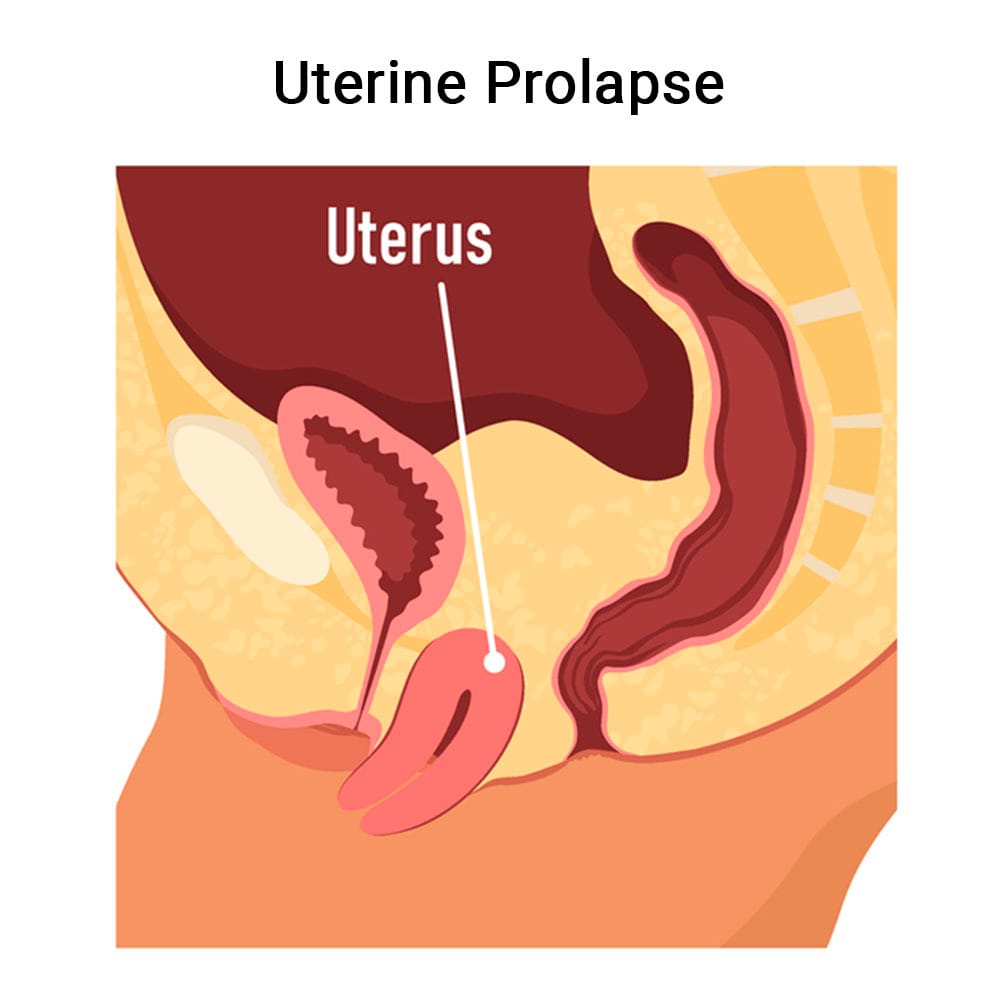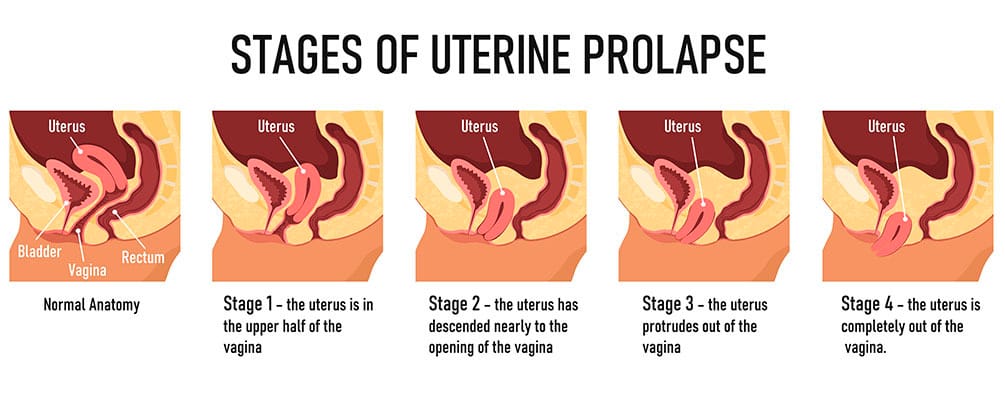What Is Uterine Prolapse?
 Prolapse means that a bodily organ is displaced from its normal position. Pelvic or uterine prolapse happens when one or more of your pelvic organs slip out of their normal position and cause a prolapsed vaginal wall. In other words, your vagina is pushed out of its normal position. This occurs because the muscles and connective tissues in your pelvic floor, which are responsible for holding these organs in place, are weakened or damaged.
Prolapse means that a bodily organ is displaced from its normal position. Pelvic or uterine prolapse happens when one or more of your pelvic organs slip out of their normal position and cause a prolapsed vaginal wall. In other words, your vagina is pushed out of its normal position. This occurs because the muscles and connective tissues in your pelvic floor, which are responsible for holding these organs in place, are weakened or damaged.
When your pelvic floor weakens, it can no longer maintain the necessary support to hold your uterus in place. With your uterus falling out of place, it can push on other organs in your pelvis, which then leads to symptoms like pelvic pain and urinary incontinence. You may even notice a bulge at the opening of your vagina that makes everyday activities uncomfortable and painful.
When you undergo any type of disruptive feelings or symptoms, you need to rely on experts in feminine health for the most accurate diagnosis and effective treatment.
In Midtown NYC, Cohen Medical Practice (CMP), led by Dr. Felix Cohen, specializes in gynecological services, including treatments for various types of pelvic prolapse, such as:
- Anterior prolapse
- Posterior prolapse
- Uterine prolapse during pregnancy
- Prolapsed cervix
What Are the Symptoms of Pelvic Prolapse?
You may notice a feeling of heaviness or pressure in your pelvic area. This sensation often gets worse when you stand for long periods of time or engage in physical activities, especially lifting or straining. When the prolapse gets worse, you may see or feel a bulge in your vaginal opening. This occurs when the pelvic organs start to fall into or outside the vaginal canal.
You may also experience trouble urinating as your bladder shifts, as well as symptoms such as:
- The feeling that your bladder isn’t completely empty
- Urinating more frequently or feeling an urgent need to go
- Leakage of urine when you cough, sneeze or laugh
When it’s more serious, irritation or sores in your vaginal tissues can cause light bleeding or unusual discharge. This happens due to friction between the prolapsed organ and your vaginal walls. You may feel discomfort or pain during sex due to the prolapse. You may also notice a reduction in sensation or satisfaction.
Other reported symptoms of uterine prolapse stages include:
- Feeling tired or uncomfortable throughout the day
- Experiencing abnormal vaginal bleeding or unusual discharge
- Having difficulty with bowel movements
- Undergoing pain in your lower back
What Are the Causes of a Prolapsed Uterus?
If you have had one or more vaginal deliveries, this can be a cause of uterine prolapse during pregnancy or following subsequent pregnancies. The strain placed on your pelvic floor as the baby passes through the birth canal stretches and weakens these muscles. As you age, the muscles and tissues in your pelvic area naturally lose strength and elasticity. This weakening process makes you more vulnerable to pelvic prolapse.
Other causes and risk factors include:
- Hormonal changes
- Chronic cough
- Obesity
- Heavy lifting
- High-Impact exercise
Your genetics may also play a role in your risk for pelvic prolapse. If women in your family have experienced prolapse or have naturally weaker connective tissues, you may be at a higher risk of developing the condition.
How Is Uterine Prolapse Diagnosed?
Your CMP doctor starts by asking about your symptoms, medical history and lifestyle. He performs a pelvic exam by inserting a speculum to examine how your pelvic organs are positioned while asking you to bear down or cough.
Other diagnostic processes include:
- Imaging tests such as an MRI
- Specialized tests such as a defecography or urodynamic testing
- Sonogram
After your exam and tests are done, your doctor grades the vaginal hernia based on how far your organs have descended. They classify your prolapsed vagina as being mild, moderate, more advanced or severe, which then is used to guide your treatment plan.

What Treatment Options Are Available for Pelvic Pain Prolapse?
Whether you’re diagnosed with mild symptoms or more advanced prolapse, there are both non-surgical and surgical options to fit your specific needs and health goals. If a prolapse is mild and you are hoping to avoid surgery, your doctor may recommend Kegel exercises to strengthen your pelvic floor muscles and provide support for your organs.
Alternatively, minimally invasive prolapsed surgery options include:
- Vaginal vault suspension
- Placement of a vaginal pessary, which is an implanted device that holds your uterus in place
- Uterine suspension
- Colpocleisis
- Pelvic floor reconstruction
- Sacrocolpopexy
Whether you need non-surgical treatments like pelvic floor exercises and pessaries or surgical options, Dr. Felix Cohen and his team discuss your options and help you find the best alternative for your unique situation. Contact Cohen Medical Practice (CMP) to discover your treatment options and schedule a consultation today.

